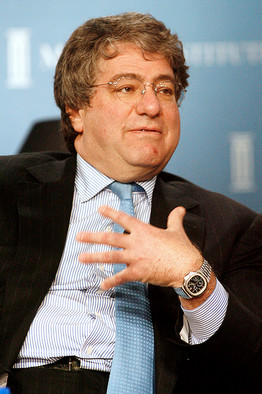Pension investment fees: Very little transparency and it’s our money.

Leon Black, head of Apollo Global Management, receives discounts paid for by public pension funds
On Sunday The New York Times business writer Gretchen Morgenson discusses pension theft. This time not by politicians, but by Wall Street private equity firms.
Some might say that is a distinction without a difference.
Who comes first, the investors or the person who manages their money?
That question is crucial for any investor. But it poses a special challenge for retired firefighters, police officers, teachers and other employees who may not know that their retirement money is being held in private equity funds.
These are opaque and costly investment vehicles that borrow money to buy companies and sell them, ideally, for a profit. The secrecy under which this $3.5 trillion industry operates has essentially required millions of people whose pensions are invested in these funds to simply trust that they are being treated fairly.
The pension theft addressed by Morgenson has three components.
Fees to wealthy private equity firms (like Bruce Rauner’s GTCR) are discounted, while public pension funds are charged higher fees. This means our pension funds are essentially underwriting private equity profits in addition to returns on investments. Call it skimming.
The implications of such arrangements seem troubling: Wealthy private equity funds receive discounts on legal, accounting and other outside work while pension fund investors, like retired bus drivers, librarians and teachers, pay full freight or, in some cases, a premium.
A second component of the theft is the charging of fees for work not done.
Regulators have identified certain fees as problematic. One example is the so-called monitoring fee, which investors pay to private equity firms, ostensiblyfor overseeing portfolio companies in the funds.
Often, though, the firms charged investors for the monitoring of companies no longer in fund portfolios. After the S.E.C. highlighted this practice last year, some firms, like Blackstone, stopped doing it.
A third issue is the lack of transparency.
“It puts the lie to the fact that we are partners with the private equity firms,” Mr. Jelincic said. “We are simply a source of income to the general partners; we are not partners.”
Private equity investors have not typically been informed of the vendor Pension investment fees: Very little transparency and it’s our money. | Fred Klonsky:
